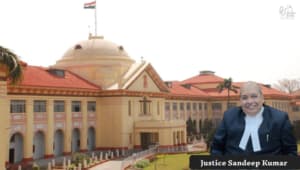2019 Amendment to Motor Vehicles Act: Insurer’s Liability to Pay Claimants and Right to Recover from Owner Remains Intact, Rules Allahabad HC
The Allahabad High Court has clarified that the Motor Vehicles (Amendment) Act, 2019 does not absolve insurance companies from their liability to pay compensation to accident victims or their right to recover the amount from the vehicle owner. The court upheld the principle of “Pay and Recover”, ensuring that third-party rights remain protected under the amended law.
Read Also:- Supreme Court Upholds Karnataka Transport Law: Repeal of 1976 Act Valid Without Fresh Presidential Assent
Justice Kshitij Shailendra, while delivering the judgment, stated:
“The Court, therefore, holds that mere omission of proviso attached to sub-section (4) of Section 149 of Motor Vehicles Act, 1988 after its replacement by Section 150 of Motor Vehicles (Amendment) Act, 2019 (32 of 2019), neither takes away the liability of the insurer to pay the claimants nor its right to recover the said amount from the owner.”
Background of the Case
The case arose from a tragic accident on May 29, 2022, involving an ECO car and a bus insured by ICICI Lombard General Insurance Company. The driver of the ECO car succumbed to his injuries, and the legal heirs filed a claim for compensation. The Motor Accident Claims Tribunal, Kanpur Dehat, awarded compensation of ₹20,11,800 against the bus owner and driver, holding the insurance company liable to pay the amount initially, with the right to recover it from the owner and driver.
Read Also:- SC Upholds Karnataka Law Granting Transport Permit Issuance Power to STA Secretary
The insurance company challenged this decision, arguing that the 2019 Amendment Act had removed its liability to pay compensation in cases of policy breaches, as the proviso to Section 149(4) of the Motor Vehicles Act, 1988, had been omitted.
Section 149 of the Motor Vehicles Act, 1988: This section outlined the circumstances under which an insurance company was liable to pay compensation. It also provided the insurer with the right to recover the amount from the insured (vehicle owner) in case of policy breaches.
Section 150 (Amended Act, 2019): The 2019 Amendment Act replaced Section 149 with Section 150 and omitted the proviso to Section 149(4), which allowed insurers to recover compensation from the owner.
Read Also:- Supreme Court Declares Carpentry a Skilled Profession: Compensation Enhanced for Carpenter in Accident Case
The central question before the court was whether the omission of the proviso in the amended Act removed the insurer’s liability to pay compensation and its right to recover from the owner for accidents occurring after April 1, 2022.
High Court’s Analysis and Verdict
The court meticulously analyzed the provisions of the Motor Vehicles Act, both before and after the 2019 amendments, and made the following key observations:
Third-Party Protection Remains Paramount: The court emphasized that the Motor Vehicles Act is a social welfare legislation aimed at protecting third-party victims of road accidents. The amended Section 147 still mandates that insurance policies cover third-party risks in cases of death or bodily injury.
Indemnification by Insurer Continues: The court held that even after the amendment, the insurer’s obligation to indemnify the owner remains intact. While the insurer may escape liability to pay the claimant directly in certain cases, it must still indemnify the owner and then recover the amount from them.
“Such indemnification will still continue to remain alive, and the insurer shall have to first pay the compensation through indemnification and, then, it shall have a right to recover from the owner the amount paid as the ultimate liability shall have to be borne by the owner and not by the insurer.”
Distinction Between “Paid” and “Payable”: The court clarified the difference between the terms “paid” and “payable”. The insurer can only recover the amount it has already paid to the claimant, not the amount that is payable. This ensures that the insurer’s financial burden is temporary, as it can later recover the amount from the owner.
Purpose of the Amendment: The court noted that the 2019 Amendment Act was introduced to simplify insurance provisions and provide expeditious help to accident victims and their families. The amendment was not intended to remove the insurer’s liability to pay compensation but to streamline the process
“The emotional and social trauma caused to the family which loses its breadwinner is still one of the special considerations as set forth in the Statement above. The Bill was brought with an object to replace the existing provisions of insurance with simplified provisions in order to provide expeditious help to accident victims and their families.”
Doctrine of Purposive Interpretation: Applying the doctrine of purposive interpretation, the court held that excluding the insurer’s liability to pay at the first instance would be “too wild a proposition” and would burden the victims with lengthy execution proceedings. The court emphasized that the amendment does not take away the insurer’s right to pay and later recover from the owner.
Case Title : ICICI Lombard General Insurance Co Ltd v. Smt. Arti Devi and 8 Others [FIRST APPEAL FROM ORDER No. - 1780 of 2024]















